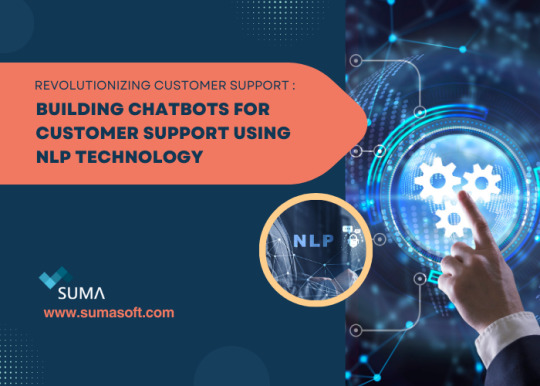#CustomerSupport Chatbots B2BCustomerSupport NLPTechnology RevolutionizingCustomerSupport AIAssistants CustomerExperience Automation Customer
Explore tagged Tumblr posts
Photo

Revolutionizing Customer Support: Building chatbots for B2B customer support using NLP technology.
Embracing NLP technology for building chatbots has become a game-changer for businesses. By harnessing the power of NLP algorithms, organizations can enhance efficiency, deliver personalized interactions, and improve customer satisfaction. The statistics and success stories presented in this article demonstrate the immense potential of NLP-powered chatbots in revolutionizing B2B customer support. As decision-makers in organizations, it is essential to recognize the value that NLP technology brings and consider its implementation within your customer support strategy.
In the dynamic and rapidly evolving business, delivering exceptional customer support is paramount for organizations aiming to stay ahead of the competition. To meet the evolving demands of customers, many forward-thinking companies are turning to cutting-edge technologies like Natural Language Processing (NLP) to build chatbots. These intelligent chatbots can transform customer support interactions, enhancing efficiency and improving customer satisfaction. In this article, we explore the benefits of utilizing NLP technology for customer support and provide relevant statistics to demonstrate its effectiveness.
Understanding the Power of NLP in Customer Support:
Natural Language Processing, a branch of artificial intelligence, enables machines to understand and interpret human language. By leveraging NLP technology, chatbots can comprehend customer queries, provide accurate responses, and simulate human-like conversations. This transformative capability has revolutionized the B2B customer support landscape, offering several significant advantages:
1.Enhanced Efficiency: NLP-powered chatbots handle multiple customer queries simultaneously, significantly reducing response times and increasing the efficiency of support operations. According to research, implementing chatbots can lead to a 30% reduction in customer support costs.
2. 24/7 Availability: Chatbots equipped with NLP technology are available round-the-clock, providing uninterrupted support to B2B customers in different time zones. This ensures timely responses and improves overall customer experience.
3.Personalized Interactions: Advanced NLP machine learning algorithms enable chatbots to analyze customer preferences, past interactions, and purchase history, allowing them to deliver personalized recommendations and tailored solutions. This level of personalization enhances customer satisfaction and strengthens relationships.
The Impact of NLP-Powered Chatbots on Customer Satisfaction:
1) Quick Issue Resolution: Research shows that 66% of customers value quick resolution of issues when interacting with chatbots. NLP-driven chatbots can swiftly understand complex queries, identify the root cause of problems, and provide relevant solutions promptly. This streamlined process ensures customer issues are resolved efficiently, leading to higher satisfaction rates.
2) Improved Response Accuracy: NLP algorithms continuously learn from customer interactions, enabling chatbots to refine their responses over time. With an accuracy rate of up to 90%, NLP-powered chatbots provide reliable and consistent answers, reducing the chances of customer dissatisfaction due to misinformation or lack of knowledge.
Real-world Success Stories:
a) IBM Watson Assistant: IBM Watson Assistant, powered by NLP technology, has transformed B2B customer support for numerous organizations. A notable success story is Autodesk, a leading software company, which implemented IBM Watson Assistant to handle customer queries. As a result, Autodesk achieved a 99% accuracy rate in responses and significantly reduced response times.
b) Salesforce Einstein: Salesforce Einstein, an AI-powered platform, incorporates NLP to improve customer support experiences. A case in point is Sonos, a wireless audio system manufacturer. By deploying Salesforce Einstein, Sonos witnessed a 23% reduction in support costs, while customer satisfaction increased by 10%.
Overcoming Challenges and Ensuring Success:
Training Data Quality: To build effective chatbots, organizations must ensure high-quality training data. Investing in diverse datasets and employing data annotation techniques help improve the accuracy and performance of NLP models.
Seamless Integration: Chatbots should seamlessly integrate with existing customer support systems and workflows. This ensures a smooth transition and allows organizations to leverage existing knowledge bases and resources effectively.
Conclusion:
Embracing NLP technology for building chatbots has become a game-changer for businesses. By harnessing the power of NLP algorithms, organizations can enhance efficiency, deliver personalized interactions, and improve customer satisfaction. The statistics and success stories presented in this article demonstrate the immense potential of NLP-powered chatbots in revolutionizing B2B customer support. As decision-makers in organizations, it is essential to recognize the value that NLP technology brings and consider its implementation within your customer support strategy.
0 notes